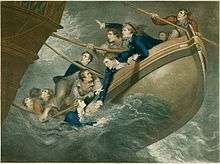HMS Centaur (1759)
For other ships with the same name, see HMS Centaur and French ship Centaure.
 engraving after James Northcote | |
| History | |
|---|---|
| Name: | Centaure |
| Launched: | 1757 |
| Captured: | 18 August 1759, by Royal Navy |
| Name: | HMS Centaur |
| Acquired: | 18 August 1759 |
| Fate: | Wrecked, 1782 |
| General characteristics [1] | |
| Class and type: | 74-gun third rate ship of the line |
| Tons burthen: | 1739 |
| Length: | 175 ft 8 in (53.54 m) (gundeck) |
| Beam: | 47 ft 5 in (14.45 m) |
| Depth of hold: | 20 ft (6.1 m) |
| Propulsion: | Sails |
| Sail plan: | Full rigged ship |
| Armament: | 74 guns of various weights of shot |
Centaure was a 74-gun ship of the line of the French Navy, launched at Toulon in 1757.
The Royal Navy captured Centaure at the Battle of Lagos[2] on 18 August 1759, and commissioned her as the Third Rate HMS Centaur.[1]
Loss
In September 1782, the Centaur was one of the ships escorting prizes back to Britain from Jamaica, when she foundered during the 1782 Central Atlantic hurricane near the Newfoundland Banks. Captain John Nicholson Inglefield, along with eleven of his crew, survived the wreck in one of the ship's pinnaces, arriving at the Azores after sailing in an open boat for 16 days without compass quadrant or sail, and only two quart bottles of water; some 400 of her crew perished.[2]
See also
Notes
References
- Lavery, Brian (2003) The Ship of the Line - Volume 1: The development of the battlefleet 1650-1850. Conway Maritime Press. ISBN 0-85177-252-8.
- John Nicholson Inglefield, Captain Inglefield's narrative concerning the loss of the 'Centaur', 1783
This article is issued from Wikipedia - version of the 8/30/2016. The text is available under the Creative Commons Attribution/Share Alike but additional terms may apply for the media files.